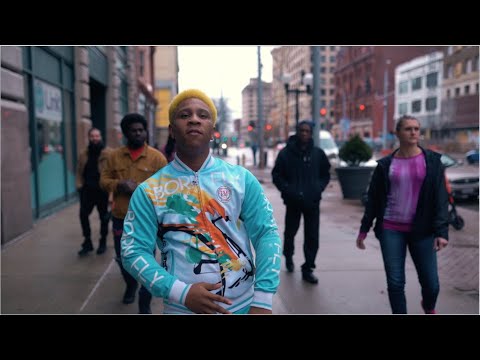In 2020, a song by a rapper from Dayton, YelloPain, went viral for its detailed but clear breakdown of how government works and passionate appeal to vote in every election. The video for “My Vote Don’t Count” has been viewed nearly 3 million times on YouTube and generated thousands of comments, including many from teachers thanking and praising him for the accessible civics lesson.
The video has been circulating again in recent months, with another highly consequential presidential election looming. Signal Cleveland caught up with YelloPain to ask about his foray into political art and what he’s planning next. This Q&A has been lightly edited for brevity and clarity.
Q: I read in an interview that you credit your cousin, Desiree Tims, who was running for Congress, with inspiring this song.
She was the initial inspiration out the gate. She asked me to make a song about voting. And to be honest, at the time, I turned it down. I was like, ‘Cuz, I love you, but, you know, that’s not my speed. I’m not into politics, the political stuff.’ That’s just where my head was at at the time.
And she was like, ‘Why don’t you care about politics?’ And I told her, like, because I voted for Obama back in 2012 I thought my life was going to change, and I didn’t see too many changes in my immediate life.
And she said, ‘Well, what are some things that you would like to see changed?’ I started to list off the different things in my community. I’m from Dayton, Ohio, and at that time, it was these crazy potholes in the street. I got friends that’s doing extra so much time in jail for small crimes. I was listing the minimum wage, etc., you know, and how they started giving less money out on the food stamps. I’m not on food stamps, but I got family members that had those complaints. So it was just a lot of things that I was just like, you know, ‘They don’t care about us.’
And then she explained to me who ‘they’ were. She told me about the different levels of government, and broke it down for me. She’s like, ‘You know those potholes? There’s a transportation bill that can be expedited to get those roads fixed.’
And she started to list all of the different people, the state reps, the city council members, the judges. And that was eye opening.
So you mean to tell me that everything in our community, down to the trash pickup, to what the kids eat in school, is directly tied to somebody that’s in office? That blew my mind. And then I became extremely passionate about it, and then I started to study the process even more.
🗳️For more on this year’s November election, visit our Election Signals 2024 page.
Q: What was the writing process like? Did you remember much about the structure of government from middle school or did you have to do some research?
They gave us a very basic understanding of the political process [in school] and I didn’t retain any of it. Honestly, I even forgot the three branches of government partially before relearning it. If you watch the music video of ‘My Vote Don’t Count,’ and even the remix video, ‘My Vote Will Count,’ there’s a chart with executive, legislative and judicial and all the different people that are under those categories. That’s the exact same chart that my cousin made for me when she was teaching me the process.
That song took me three months to write. That was the longest process I ever had, just making sure that I’m not misleading people because I was learning it as I was writing.”
Q: A lot of the comments under the original video on YouTube are from teachers, and they’re praising and thanking you. Was that a surprise?
Yeah, it was a bit of a surprise. And even beyond the teachers wanting to implement it into their curriculums and showing their classes, the amount of messages I got on my Instagram accounts and Facebook where people are telling me, ‘Hey, I’ve never voted in my life, but this song encouraged me to vote,’ or, ‘I never even knew this stuff about the government,’ it was confirmation that, hey, this song was worth it.
Q: A more recent commenter asked: “Am I the only one who thinks we need a new 2024 version?” Have you considered writing about politics again?
I think that education is more important than the jingle, you know what I mean? I did a documentary, it’s not out yet, but it’s called ‘Simplified,’ and it’s doing exactly what the song did, but to a higher level. I went to the community and I asked the people, ‘Hey, what are the problems that you’re seeing?’ I got the concerns of the people and took them to elected officials in my hometown, Dayton, and in Atlanta, Georgia, where I currently reside.
And I talked to the state reps and mayors, etc., and I asked them, ‘Hey, this is what the people are concerned with, who’s responsible for fixing these things, and what are some things that they can do?’ And I bridge the gap between the people who don’t know and the people who do know.
Q: Have you thought about running for office?
[Laughs] No. I’m a very busy person, and anybody that is in office, I think that their focus should be on being in office. I’m still chasing a rap career. I just released a music video, actually, two days ago. It’s called ‘Driving in Circles.’ It was about my encounter with a homeless man. That’s my most recent video, but it’s a lot more coming soon, so just stay tuned.





